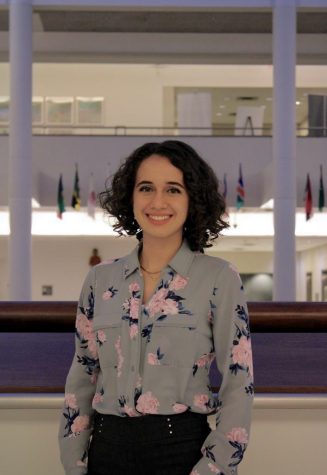Senate Meeting: USG allocates club budgets, hosts guest speaker Terrence Martell

USG
May 6, 2021
Baruch College’s Undergraduate Student Government held its 11th Senate meeting of the spring 2021 semester on May 4.
Chair of Finance Lesli Cuamani reported to USG on 47 club budgets. She said that each student organization was satisfied with the amount it was allocated.
Recently chartered clubs, such as Books & Beyond, the Debate Team, Lexington Music and Our Beauty in All Sizes, were allocated amounts ranging from $450 to $1,530.
50Five Capital requested $870 and was allocated $570. The Japan Club, the National Association of Black Accountants and the United Sikh Association requested the maximum club budget amount — $10,000 — but were allocated amounts ranging from $6,935 to $9,425.
Ascend proposed a budget of $5,455 but received $3,500. Similarly, ASEDOM requested $5,235 and was allocated $3,510. The Finance and Economy Society proposed a budget of $2,910. It was allocated $2,900 due to a decrease in co-sponsorships.
The club with the smallest allocated budget — $110 — was Financial Quants and Engineers, which has been inactive for most of this year.
The E-Sports Association, the Graduate Student Assembly, Women Empowered for Success and the Gender Love And Sexuality Spectrum received smaller budgets than requested due to an inability to justify the need for larger funds.
The Pre-Law Society requested $5,475 but received $4,360. Similarly, Youth Organization for Israel asked for $5,055 but was allocated $3,760.
Since it is unlikely that club events will be in-person, Cuamani reduced the supplies budgets for the Biomed Society, Caribbean Student Association, Japanese Anime Asylum and She’s the First.
The Pakistani Student Association requested $3,370 but received $2,000, an amount similar to its last-year budget.
Kesher, Mexiculture, Women in Islam, Himalayan Club, the Armenian Society, the International Student Organization and the Uzbek Students Association were allocated $10 more than their requested budgets in the miscellaneous line for co-sponsorships.
The Zicklin Undergraduate Tax Society and Women Improving Next Generation’s Society were allocated budgets less than $500.
Cuamani allocated the Muslim Student Association, Circle K and the Association for Information Systems the full amount of their requested budget due to good club growth.
UNICEF at Baruch, Alpha Kappa Psi, the Accounting Society, the Actuarial Science Society, AIESIC, the Investment Management Group and the Latin American Student Organization were allocated budgets ranging from $1,620 to $4,000.
Hillel, the Organization of Soviet Students and the Conversation Partners Program showed better spending habits and reasonable money usage. The Indian Student Association, Sigma Alpha Delta and West Indian Culture Club received budgets ranging from $4,000 to $8,300.
USG then listened to a guest speaker, professor of finance Terrence Martell. He is also the director of the Weissman Center for International Business and the chair of the Baruch Faculty Senate.
He proposed working with USG to pass a joint resolution addressing the “consistent underfunding of Baruch by CUNY.”
Both student tuition and state aid are used to fund the college. Baruch students pay 70% of the total operating budget, while the remaining 30% comes from the state.
Historically, Baruch students pay a higher percentage compared to other CUNY colleges. The school paying the second highest percentage, Hunter College, pays 61% of its total operating budget. The school paying the lowest percentage — 38% — is Medgar Evers College.
“You have been systemically screwed for 20 years,” Martell said.
He went on to say that he has been fighting for this cause for a long time. He now hopes to pass a resolution in the Baruch Faculty Senate asking that the percentage not exceed 60%, which is comparable to John Jay College, Queens College and Brooklyn College, whose students pay 57-59% of their operating budgets.
Martell admitted that he doubts that the percentage will be lowered but hoped that these efforts will stop the percentage from increasing in the future.
After a short recess, USG reviewed its own budget.
Editor’s Note: Emanuela Gallo, who wrote this article, is a campus ambassador for the Pre-Law Society.







